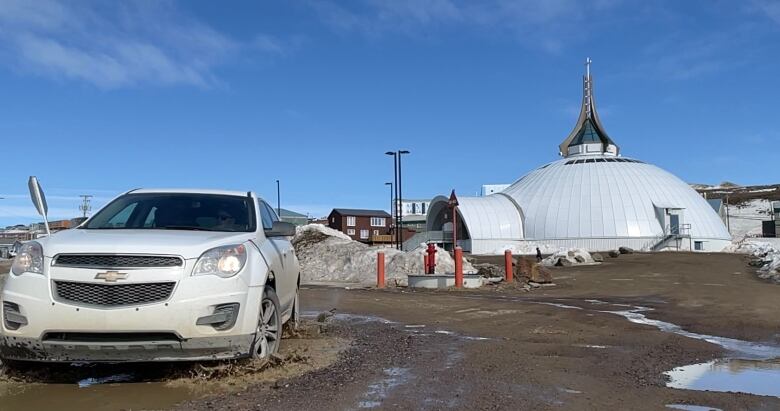[ad_1]
In 2019, the City of Iqaluit put the finishing touches on the paving of Sivumugiaq street, formerly known as Federal road.
The $2.5 million dollar project has stood the test of time along the 1.3 km traffic artery to the airport, without a single pothole to speak of. The smooth slab stands in start contrast to much of Iqaluit’s pothole-ridden roadways, which returned over the past month for another season.
Four years later drivers can still cruise along Sivumugiaq without worry of having to ride the brakes, or carefully align their wheelbase, or even cross into another lane to avoid an incoming pothole.
Which begs the ultimate question for Iqaluit commuters: why can’t the rest of the city’s roads be so luxurious?
The answer, said deputy Mayor Kyle Sheppard, is because with the incoming upgrades to Iqaluit’s water infrastructure, any newly paved roads would just have to be dug up anyway.

“It doesn’t make sense to pave anything until [the water infrastructure] work is done,” Sheppard said, considering the costs involved.
“The city looked at paving the portion of the new port to the Baffin Gas area a couple of years ago, and at that time it was $7 to $8 million just for that one [3.5 km] section.”
And while it may come as no surprise to many Iqalungmiut, Sivumugiaq street was properly engineered, while many of the city’s roadways were not.
“That road was fully and properly designed. It was built to allow for drainage, there’s insulating layers in there. It’s the best-designed and best-built road in town,” Sheppard said. “Ideally, that’s what we’d see for every road in town. The cost is astronomical to get that happening.”
Sheppard also pointed to the effects of climate change and the sinking permafrost as contributing factors in why Iqaluit’s roadways continue to get beat up year-after-year.
“Roads are actually getting worse in the springtime than they were even [a few] years ago. In a perfect world, we’d be able to re-engineer all of our roads and get them paved. It’s going to be a long-term process to get there.”
‘Pave the roads’ residents say
According to figures from the city, Iqaluit maintains about 51.5 kilometres of road — not including the 8 kilometres of road to the new landfill. In all, 53 per cent of it is paved.
Speaking to residents on Iqaluit’s streets, many said the city’s rationale made sense, though some questioned whether the cost of maintaining the roads could be put toward paving them instead. The city spent $2.6 million on road maintenance last year, with another $1.7 million going toward maintaining heavy equipment.
“If you look at the cost per kilometre of grading versus paving, there’s no comparison,” Sheppard said. “We could grade and maintain for a century or more as compared to the cost of paving them. The work needs to be done eventually, but it involves re-engineering the roads.”
Still, one sentiment remained among residents who spoke to CBC News.
“Pave the roads,” said resident Darren Penny who’s been driving on these roads for 20 years. “Bite the bullet, pave the roads. It might not last long, but it’ll last a lot longer than the quick patch jobs they’re doing now.”
Christa Pooley, who’s waiting on replacement parts for her Jeep, said she’d like to see heavy-traffic areas prioritized.
“In and around Baffin Canners. Certainly around the post office where I have to go pick up my parcels, like that’s awful and the public is in and out of there all the time,” she said.

“I would personally love to see them pave,” said Jeff Vito, who’s in his sophomore year on Iqaluit’s roads. “But the ones that a lot of people are complaining about, maybe filling them with rocks or sand. Just doing the bare minimum for maintenance so it doesn’t cause a lot of damage to cars.”
Vinnie Karetak, who’s lived in Iqaluit for 22 years, says the potholes are nothing new.
“If we can save ways to have our vehicles last longer without having to pay tons of money to get it replaced, repaired, bandaged up so it can be road-worthy, that would be ideal,” he said.
Beware the washboards
And while potholes may draw the most ire from Iqaluit’s commuters, it’s the washboards that really take a toll on a vehicle, says Chris Provost who owns Upper Base Garage.
He said while pothole-related repairs aren’t the bulk of his business, it’s certainly more than what other garages down south would see.

His advice for drivers is simply to slow down.
“The faster you go doesn’t make it feel any better. You may think it does, but it definitely doesn’t. It’s just making the suspension work harder,” he said, likening potholes to speed bumps.
“The big potholes, you can avoid them by driving slow through them. But the washboards when you hit it fast, it’s just doing tons of damage.”
[ad_2]
Source link
